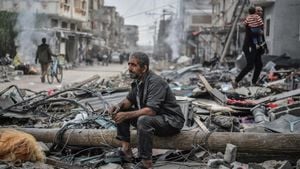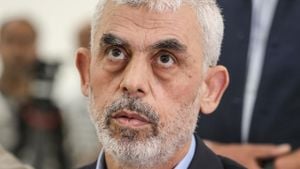The International Court of Justice (ICJ) has recently become the focal point of serious allegations against Israel, as South Africa has taken the unprecedented step of filing a case accusing Israel of genocide against the Palestinians.
On October 28, 2024, South Africa submitted evidence to the ICJ, describing Israel's actions as genocide under the United Nations Convention on the Prevention and Punishment of the Crime of Genocide. South Africa's Ambassador to the Netherlands, Vusi Madonsela, characterized the evidence as extensive—reportedly over 750 pages along with more than 4,000 pages of forensic documentation and supplementary materials. Such magnitude, according to the South African legal team, presented the unusual challenge of having “too much evidence,” showcasing the horrors faced by Palestinians.
South Africa's initiative to pursue this case follows the catastrophic consequences of the current conflict, which has reportedly claimed at least 43,000 Palestinian lives, compounding humanitarian distress exacerbated by the constrained entry of aid. The South African government’s statement emphasized the urgency of this filing, coinciding with what they deemed intensified atrocities against civilians and other vulnerable populations not just in Gaza but potentially extending to Lebanon.
The ICJ’s role becomes significant as it navigates through layers of international law. The court has already mandated provisional measures urging Israel to allow humanitarian access and cease hostilities. These preliminary orders, according to legal experts and humanitarian workers, highlight the inherent challenge faced by the ICJ: “While the court's rulings carry weight, they lack enforcement power,” noted Craig Mokhiber, former director at the UN High Commissioner for Human Rights, who resigning out of frustration with the global body's inability to restrain Israel's military actions.
Support for South Africa's legal moves has materialized globally, with nations including Spain, Colombia, Turkey, and others seeking to join the case against Israel. The essence of South Africa's findings suggests systematic intentions to destroy the Palestinians as part of Israel's broader military campaign, which they argue includes violent tactics and the deliberate restriction of life-sustaining resources—both actions regarded as breaches of international law.
On November 7, former Deputy Chief Justice of South Africa, Dikgang Moseneke, delivered the Kader Asmal Annual Memorial Lecture at the University of the Western Cape. There, he discussed the ICJ's role and emphasized the necessity for upholding international law to pave the way for lasting peace. Moseneke's remarks coincided with news of Ireland joining South Africa's genocide case against Israel, illustrating the growing international discontent toward Israeli actions.
Moseneke lamented the dire state of international judicial authority, criticizing the inability of the ICJ to enforce its orders effectively. He stressed the importance of legal legitimacy and hoped for accountability as the foundation for peace. While denouncing all acts of violence, he called for equitable applications of international law to address the broader suffering encountered amid conflict.
The historical roots of this tension extend beyond recent events. Germany, for example, has faced scrutiny for its unconditional support of Israel, prompting discussions on the political and historical contexts influencing these dynamics. Many critics argue Germany’s allyship serves to obscure its past transgressions during the Nazi era, complicity alleged against those who challenge Israel's military strategies. The discussion around Germany's position highlights how deeply national narratives shape current policies and their international ramifications.
Critiques surfaced particularly during pro-Palestine demonstrations, where opposition from state authorities has stifled voices opposing Israeli actions. Reports allege police brutality and targeted crackdowns on those advocating for Palestinian rights, raising concerns about the freedom of speech and democratic practices within Europe today.
Meanwhile, the ICJ's engagements pave pathways for future dialogues surrounding international warfare and human rights advocacy. South Africa's sustained campaign against Israel’s actions potentially marks the beginning of more countries realizing litigation routes to challenge their perceptions of impunity, particularly as atrocities gain greater visibility on global platforms.
Reports from humanitarian organizations and legal institutions continue to unravel layers upon layers of complex political maneuvers, advocating for the rights of beleaguered populations such as those enduring conditions in Gaza. It aims to hold accountable nations or entities deemed violators of international regulations, reflecting the broader essence of global governance ideals championed by the UN.
Yet, questions remain about the ramifications of such cases. Will the ICJ's past rulings lead to significant change, or will they fall prey to political maneuvering and national interests overshadowing human despair? The world watches as the ICJ and involved nations navigate this delicate terrain, seeking answers.



